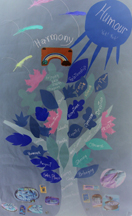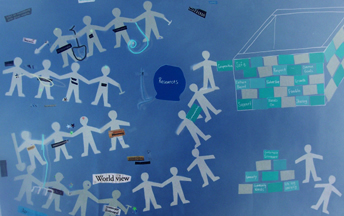The Learning Circles Project |
||
| Conway Workshop - Digby Adult Learning Association Group by Arthur Bull |
||
What first strikes you when you spend time with the Conway Workshop/Digby Adult Learning Association (DALA) Group is how much people seem to be enjoying themselves. And not only enjoying themselves, but enjoying spending time in each other’s company. There’s lots of good-humoured backchat, and lots of animated exchanges. When asked about this, the learners say it is one of the things they like about this group. As one participant put it: It’s a trusting atmosphere... people help each other. Sometimes we share information about sales that are on, or help each other with getting a lift somewhere. This feeling of mutual enjoyment in each other company, based on trust and cooperation, can be summed up by the word conviviality. This sense of conviviality is even more striking, given the fact that
this is not one group are but two groups combined, both going on here
at the same time, in a fairly small room in the basement of the Community
Education Centre (CEC) in Digby. One of the groups is sponsored by the
Conway workshop, a centre for people with physical and developmental
disabilities on the outskirts of Digby. The other is a basic upgrading
group sponsored by DALA. Both group are facilitated by the facilitators,
Kim Marshall and Joy “I like the dynamic that goes on in here. I like having two classes at the same time and. I feel that each group teach and support each other a lot …” This group has some interesting lessons to share about how learning circles have the potential of bringing together organizations in diverse collaborations, as well as different kinds of learner in diverse learning situations. The two groups work on quite different but related learning activities. The group sponsored by the DALA has 14 participants. They work on a broad range of basic skills, including English, math, computer skills, and social studies. They also have done the PLAR portfolio program. The Conway Workshop group focuses more on basic math and English skills, as well as life skills relating to employability. They have also done the portfolio program. In some ways these different learning activities reflects two sponsoring organizations. DALA is an adult education organizations that serves Digby County. It was founded in the mid 1990’s, as a development of it predecessor The Digby County Literacy Network. DALA offers a wide variety of adult education programs. At the Digby Community Education centre it offers:
It also offers programs at the Career Resource Centre, in collaboration with the community college, including transition-to-work programs, job counselling, a Community Access Program (CAP) site, Prior Learning Assessment Recognition (PLAR) and a wide range of other programs. DALA has along track record of collaborating on innovative adult education programs. The Conway workshop offers two kinds of program to it clients. The pre-vocational Program is designed to enhance the daily lives of individuals by teaching them basic life skills and empowerment to advance to the vocational department. Participants learn various skills including personal hygiene, hand/eye coordination, memory challenges, basic computer skills, and cooking and literacy skills such as printing and math. Counseling, role-play, and anger management sessions are held to assist individuals in developing appropriate social skills. It also offers a vocational program that includes:
In this program individuals are trained in a variety of employment options with the assistance of vocational instructors. These programs assist in preparing individuals for the work force and give them the experience and knowledge they need to seek employment in the community. Finally they offer a residential program, in which individuals live in supportive housing arrangements that include small option homes (three per house) and supportive apartments throughout the town of Digby. Individuals learn daily living skills and are provided with the extra supports they need to live in the community. The goal of this program is to increase participants’ independence as much as possible. For some this will mean a brief stay with us before moving on to live independently; for others it provides them the opportunity to reside in the community as active and participating members while still receiving the necessary supports. These two organizations, in a sense, are co-sponsors of the joined group that meet in the basement of the CEC. These combined groups seem to work for a number of reasons. First of all, there seems to be a very positive learning environment. This is in large part due to the Kim and Joy ‘s attentive facilitation of the group. There seems to be a balance between keeping it loose and informal and maintaining a calm learning environment. Or as one learner put it: “I like it here - nobody’s screwing around, pulling the fire alarms, like in school.” Another factor is the high degree of mutual support and peer learning. As Kim puts it: Sometimes people will say, “How do you spell this?” Or getting clarification about directions from someone else, or else I will send the group into the other room to ask other tables to help each other; same with spelling. Everybody has value and has something to teach, and by teaching each other it just reinforces what you already know. It gives you some value. I like it when they help each other. There is also a great deal of flexibility in the group. Learners work at their own pace and focus on their own goals and interests. We can work at our own pace you do what you need to do and that’s what you do. Well, you don’t have the pressure ... to keep up with the rest of the class - everyone feels the same way. Kim puts it this way: “We learn very informally, and not in structured lessons - survival skills for the workforce and at home.” What is interesting about the group is how it accommodates the great variety of goals and motivations. One person is working toward getting in to community college, another person wants to get a different job, and another is updating her portfolio. Another describes what she learns this way: What I learn? Survival. Basic things, day by day getting up, coming here, coming to school, everyday skills, preparing the night before, organizing. Another describes her learning in terms of empowerment I used to let people push me around a lot … it makes me feel a lot stronger person than I was…
... I did it a couple of years ago and I’m updating it … I liked it so much better the second time. I named it “One Voice”… I made the dream of going back to school after I did my portfolio. This multiplicity of changing goals raises an interesting question about evaluation. Clearly the richness of the learning happening in this group would not be well served by a summative, linear outcomes-based approach to evaluation. How would you evaluate the changing, diverse outcomes that emerge form a group like this? Clearly there need to be more work done on the development of evaluative approaches that are better matched to the complex, transformative dynamics of group learning in groups like this. Spending some time with this group was very enjoyable. There is such a sense of caring and having fun and accepting difference. As one learner put it: “Good group. Make good friends.” |
||

